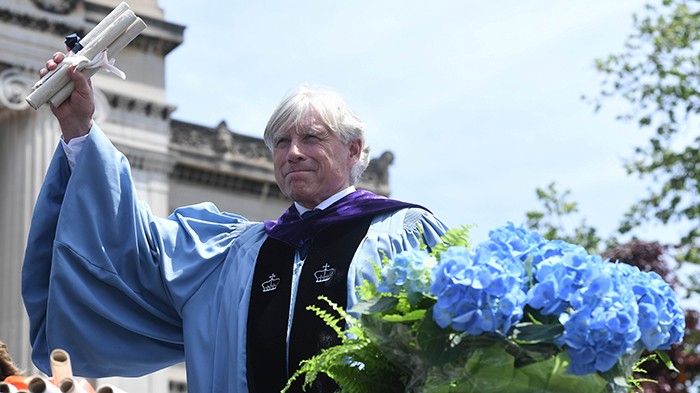Photo Essay: Two Decades of President Bollinger's Most Memorable Commencement Speeches
As we look ahead to President Lee C. Bollinger’s last Commencement as president on May 17, here are some highlights from the last 20 years.
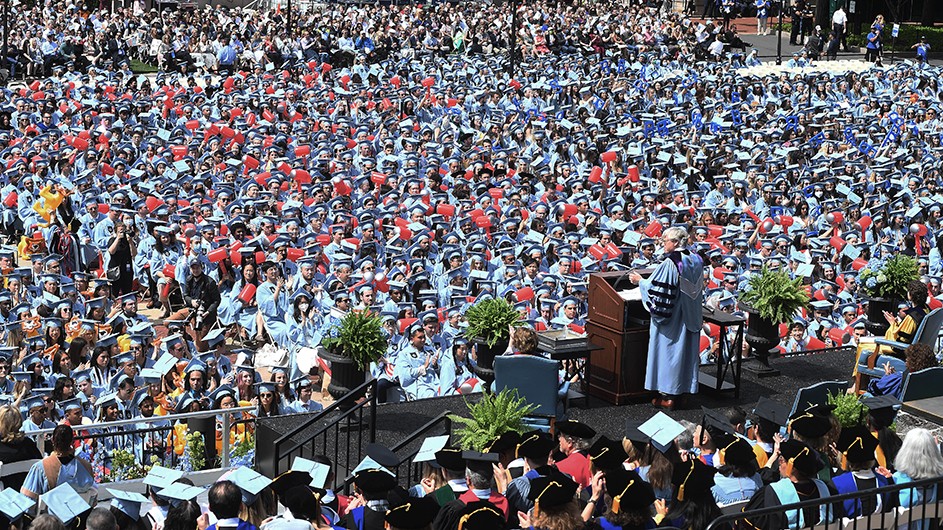
Each year, in front of all the graduates and their families, the president of Columbia University gives the Commencement address. For the past two decades, that president has been Lee C. Bollinger.
As we look ahead to Bollinger’s last Commencement as president on May 17, 2023, here are some highlights from the last twenty years.
President Bollinger's First Commencement Address
May 21, 2003
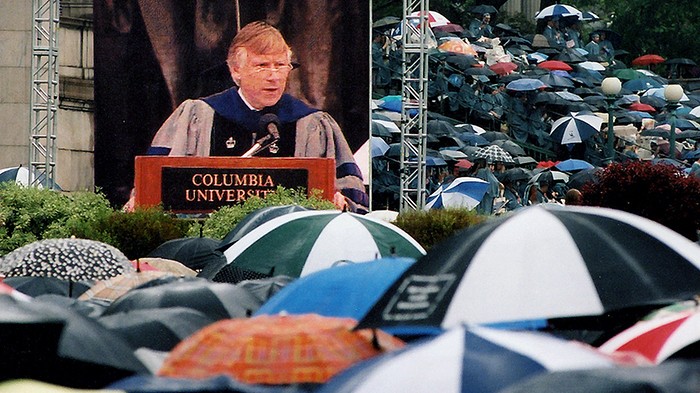
There is no escaping the reality that is before us. What are our responsibilities? What should be the character of our relationships with the other parts of the world? Do we have the right institutions to deal with the problems we will face? These are the kinds of future-shaping questions that confronted the early graduates of Columbia, like Hamilton, Jay, and Livingston, who had to figure out the Declaration of Independence and the Constitution, and this is the magnitude of the questions now confronting you, and us.
'Devote Some Part of Your Lives to Making Knowledge Whole Again'
May 17, 2006
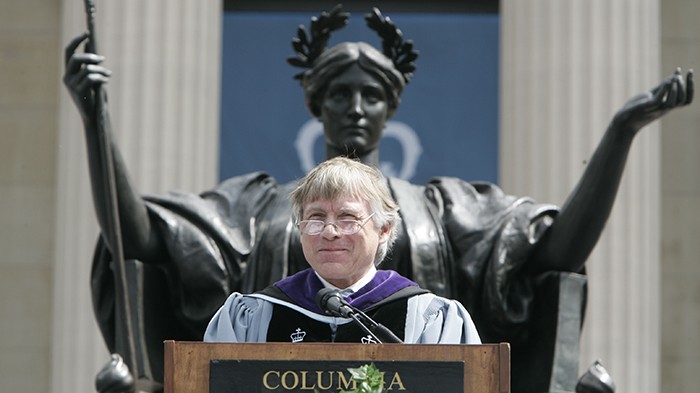
As you graduate, your challenge is to see yourself not as the center of things, but in relation to “everything.” That is what it means to see the “whole kingdom.” And that’s the only way you might answer the great questions of our age.
And, so, I urge you to appreciate how the world is changing and vastly expanding the amount of things you must now try to know. I urge you to engage in that quest with the fervor of an explorer, to avoid being trapped within your field of specialization or intimidated by others unduly protective of their own, to devote some part of your lives to making knowledge whole again, to try to transcend the details of your knowledge and to grasp the great forces at work in our time, and to do that with the courage and imagination to see yourself as small in relation to the larger whole “like a dot made with a very fine pencil."
'Yours Is a Generation of Hands-On Engagement, Service, and Giving'
May 21, 2008
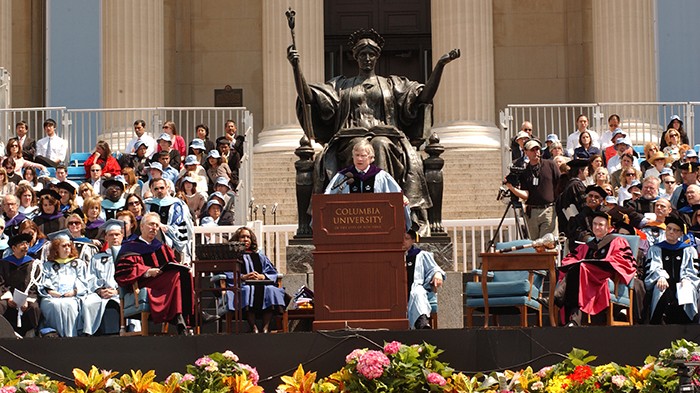
In this anniversary year of 1968, there are some who have said that students today are not as active and engaged as we were at your age. Not for a moment should anyone dare to question your capacity to integrate all these different ways of being and to find your own ways to advance the public good.
Yours is a generation of hands-on engagement, of service, and giving. In every college and school, on every campus, the habits of generous and open-hearted citizenship have been evident to those prepared to look, and admirable for its lack of concern with being visible. Your extraordinary curiosity about the bigger world and about how to have an impact on it is heartening to all of us who realize we are handing over a planet desperately in need of fresh thinking.
'No University Can Survive, and No Society Can Flourish, Unless It Aligns Itself With the Needs of the People'
May 18, 2016
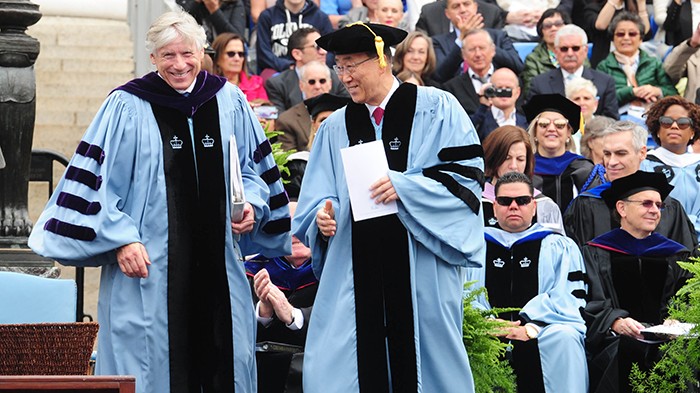
We can and should be more engaged than we are with the problems of the world, in the way that only one of the greatest universities in the world can. There is an urgency about the problems we are facing, as a nation and as a world, and there are not many who bring what we do to addressing them. Of course, the heart of our enterprise is and must remain fundamental research and advancement of knowledge. But no university can survive, and no society can flourish, unless it aligns itself with the needs of the people. We are justifiably proud of the hundreds of engagements we have with the real world outside these walls. But we can and should do much more, and I hope in the years ahead you will take added pride in the things we have and will accomplish in this domain.
'We Must Reassert Our Commitment to Open Inquiry, to Reason, and to the Sanctity of Knowledge and Understanding'
May 22, 2019
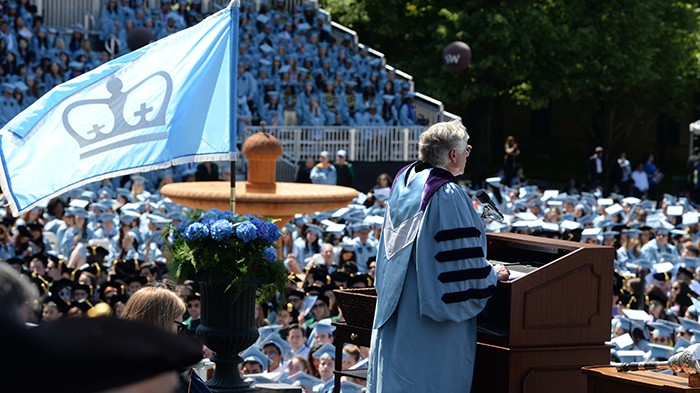
This is, above all, a moment when we must reassert our commitment to open inquiry, to reason, and to the sanctity of knowledge and understanding. As was the case a century ago, these pursuits are increasingly out-of-step with the currents of the broader world, making it all the more essential that we express our devotion to that endeavor. We must not apologize for this, but relish and champion it and find our own new contributions to this end.
Yet, at the same time, our world demands that we, as a university, be more permeable to—more blended with—life beyond the academy. The most striking physical manifestation of Columbia’s modern engagement with the larger world will be our new Manhattanville campus, which is intentionally designed to be open and welcoming to the world. Indeed, all of us feel the moral imperative to be working on solutions to global problems that frequently appear to be beyond the grasp of sovereign governments and our mostly diminished international organizations.
To spend any time here at Columbia is to be confronted with your sense of duty and purpose—along with your well-earned belief in your own ability to make a difference.
Moreover, to spend any time here at Columbia is to be confronted with your sense of duty and purpose—along with your well-earned belief in your own ability to make a difference.
This push and pull—of “truth seeking” and “meaningful action”—is a tension endemic to higher education today and to the lives you will live. The twin goals of “serv[ing] society and the world,” while protecting our “distinctive intellectual outlook,” is something we always have felt, but its centrality to our enterprise has only intensified over time.
Columbia's Second Virtual Commencement, Due to the COVID-19 Pandemic
April 30, 2021
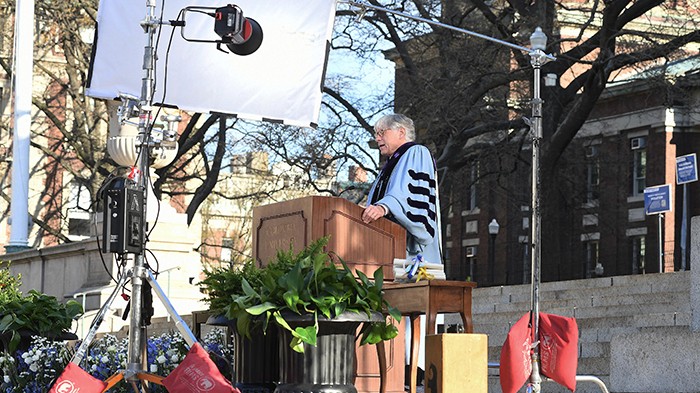
As if by some magical force, universities nurture and take advantage of the human desire to know, to understand, and to share and make good that knowledge. Every day our lives are sustained and undergirded by discoveries from the academy. Consider the past year. Vaccines followed experiments unlocking the basic elements of life. Guides for surviving a pandemic followed a century of study and preparations by public health experts. Treatments for viruses and other diseases were invented in academic medical centers and shared with the world. All the while, we have watched with enormous admiration and respect as, month after exhausting month, Columbia’s nurses, doctors, healthcare, and social workers persevere, selflessly devoting themselves to caring for the sick and those in need. They have waged a titanic effort to save lives and to support the most vulnerable among us, and they have earned our everlasting gratitude.
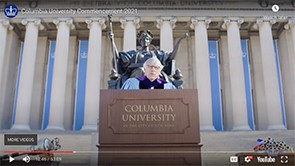
All your life you will draw upon and learn from the experiences you have just had. The period of time around 1968 was revolutionary in many respects, like today. I cannot tell you how many times I have said, “I graduated from college and came to Columbia in 1968,” and that statement reflects my sense of having been part of meaningful and historic experiences. I am sure you will do the same, saying, “I graduated from Columbia in 2021,” and, you, and everyone else, will know what that means. It is profound.
A Return to In-Person Commencement
May 18, 2022
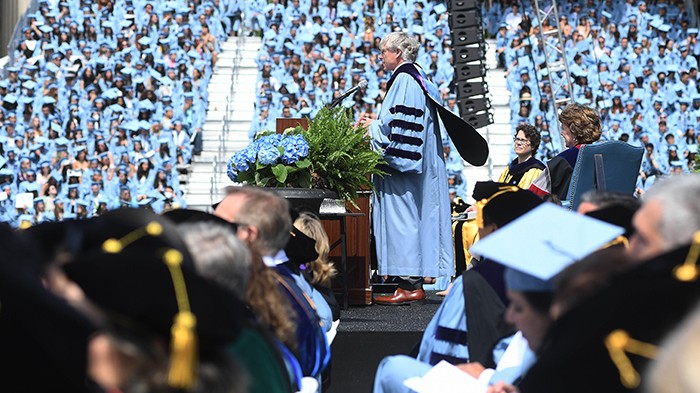
Deliberate disinformation and propaganda also, and more importantly, undermine the very idea of deep knowledge and expertise itself. Disinformation is now powering a particularly pungent form of populism in which experts are discredited, even ridiculed, and an arrogance of feeling one can believe whatever one wants to believe is settling in and becoming normal. This attitude is in direct conflict with universities, because we are society’s primary institutions for preserving and advancing what humanity has struggled to learn over the millennia. Over the past several years, our own faculty have been targets of this abuse.
But the dangers are even worse: Attacking expertise is a common tool of fascism and authoritarian regimes. When we discredit a particular piece of knowledge, we make it harder to think well. We undermine the essential task of a self-determining society to draw on the vast body of information and thought painfully developed over centuries and held safely within our academic institutions and across our cultural institutions and professions. Falsehoods today are increasingly accompanied by a rejection of a necessary humility about the limits of our knowledge and of a basic trust in others who have devoted their lives and careers to understand deeply an important subject.
So, the stakes are, indeed, very high, and we, universities, along with the democracy as a whole, are vulnerable to these campaigns and new conditions. The issue is then what comes next.
Another reason I love being president of Columbia is the opportunity to be in your midst. As students in our classrooms and laboratories, you are what makes academic life worth living.
I love being president (I recommend the job highly!), not least because I get to know just a little bit more of that amazing whole. In this time of our many trials and crises, as we reap the benefits of universities, we need to do all we can to protect them. They are not perfect, for sure. I feel strongly, for example, that we need to make the boundaries between us and the rest of the world more permeable and more connected in the betterment of human society and the world. This mission, which I call the Fourth Purpose of the University—in addition to teaching and research and service—might help people more broadly feel more respectful of what we have to offer.
But another reason I love being president of Columbia is the opportunity to be in your midst. As students in our classrooms and laboratories, you are what makes academic life worth living. We may be daunted by this troubled moment in history, but I am most certainly convinced, to the core of my being, that every one of you in your own way will help to solve these problems and to heal the world. You have demonstrated that human capacity to think well, and I know you will deploy it in meaningful and inspiring ways. Most of all, you will have the proper degree of humility that a truly great education instills.
